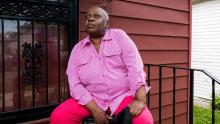0
Case study
Community:
May 1, 2019
In 2011, Cleveland had one of the highest rates of childhood lead poisoning in the United States, with almost one of every five children in the city receiving this diagnosis. Childhood asthma rates were also extremely high, especially for children living in poverty, according to 2008 statewide statistics for Ohio. Follow along in this new case study with the Engaging the Community in New Approaches to Healthy Housing (ECNAHH) initiative, part the BUILD Health Challenge’s first cohort, as they worked to reduce the occurrence of asthma, chronic obstructive pulmonary disease (COPD), and lead poisoning related to unhealthy housing conditions in three sub-neighborhoods in Cleveland.
Authored by: The BUILD Health Challenge
Topics: Health, Midwest, Partnerships, Research
 Shared by Housing Is
Shared by Housing Is
Housing Is posted a
on Jun 13, 2019
The BUILD Health Challenge
In 2011, Cleveland had one of the highest rates of childhood lead poisoning in the United States, with almost one of every five children in the city receiving this diagnosis.
0
Report
Community:
In 2017, the Bipartisan Policy Center and the Center for Outcomes Research and Education (CORE) spoke with over 90 national thought leaders and stakeholders about the current state of rural health care in the Upper Midwest region, including Iowa, Minnesota, Montana, Nebraska, North Dakota, South Dakota, and Wyoming. BPC and CORE used these discussions to determine the real-world implications of existing federal policies, to understand ongoing care challenges, and to identify opportunities for improvement in rural health care access and delivery.
Authored by: Bipartisan Policy Center
Topics: Health, Low-income, Midwest, Research, Seniors
 Shared by Housing Is
Shared by Housing Is
Housing Is posted a
on Jun 12, 2019
In 2017, the Bipartisan Policy Center and the Center for Outcomes Research and Education (CORE) spoke with over 90 national thought leaders and stakeholders about the current state of rural health care in the Upper Midwest region, including Iowa, Minnesota, Montana, Nebraska, North Dakota, South Dak
0
Podcast
Community:
Padma Thangaraj, MS, PMP, is the Vice President of Information Services & Analytics at All Chicago Making Homelessness History, a nonprofit organization that is working to integrate housing, health, and human services data to coordinate care for Chicago residents that are experiencing housing insecurity or homelessness. As one of the pilot awardees of DASH CIC-START, All Chicago worked to refine their mechanisms for exchanging data between hospitals, health care payers, and the county’s Homeless Management Information System (HMIS). She joined the podcast to share her lessons learned and advice for others working to improve improve residential stability and health outcomes through the integration of HMIS and other data.
Authored by: All In: Data for Community Health
Topics: Data sharing, Health, Homelessness, Housing, Midwest
 Shared by Housing Is
Shared by Housing Is
Housing Is posted a
on May 2, 2019
All In: Data for Community Health
Padma Thangaraj, MS, PMP, is the Vice President of Information Services & Analytics at All Chicago Making Homelessness History, a nonprofit organization that is working to integrate housing, health, and human services data to coordinate care for Chicago residents that are experiencing housing in
0
Publication
Community:
Apr 1, 2019
The Housing and Medicaid Services Pilot Program in Indianapolis, also known as the Blue Triangle Housing Program, is a collaboration that includes Anthem, the City of Indianapolis, a non-profit housing organization, and a community mental health center (CMHC).
Authored by: CSH
Topics: Health, Housing, Medicaid / Medicare, Midwest, Partnerships, Supportive housing
 Shared by Housing Is
Shared by Housing Is
Housing Is posted a
on Apr 4, 2019
The Housing and Medicaid Services Pilot Program in Indianapolis, also known as the Blue Triangle Housing Program, is a collaboration that includes Anthem, the City of Indianapolis, a non-profit housing organization, and a community mental health center (CMHC).
0
Podcast
Community:
This episode features two guests from the University of Chicago—Dr. Julia Koschinsky, the Executive Director for the Center for Spatial Data Science, and Dr. Nicole Marwell, an Associate Professor in the School of Social Service Administration. They are leading a project, funded by the Public Health National Center for Innovations (PHNCI), which is analyzing data on geographic access to health and human services to help government officials address gaps and maximize the impact of existing resources. The project will offer a replicable framework and tool for analyzing and improving distributions of public funds for health and human services.
Authored by: All In: Data for Community Health
Topics: Data sharing, Health, Midwest, Research
 Shared by Housing Is
Shared by Housing Is
Housing Is posted a
on Mar 19, 2019
All In: Data for Community Health
This episode features two guests from the University of Chicago—Dr. Julia Koschinsky, the Executive Director for the Center for Spatial Data Science, and Dr. Nicole Marwell, an Associate Professor in the School of Social Service Administration.
0
Webinar
Community:
Feb 28, 2019
Join us for an examination of how cross-sector data sharing initiatives are being used to tackle tough public health problems. The webinar will provide an in-depth look at a cross-sector collaboration in Illinois between public health, law enforcement, emergency medical services, a fire department and a jail aimed at addressing the needs of high utilizers of behavioral health services.
Authored by: The Network for Public Health Law
Topics: Criminal justice, Data sharing, Health, Mental health, Midwest, Partnerships, Safety, Stability
 Shared by Housing Is
Shared by Housing Is
Housing Is posted a
on Mar 6, 2019
The Network for Public Health Law
Join us for an examination of how cross-sector data sharing initiatives are being used to tackle tough public health problems.
0
News Article
Community:
Jan 6, 2019
These programs, available at 10 Wichita middle and high schools so far, include extended serving times in cafeterias, grab-and-go breakfasts from carts or kiosks, and “second-chance breakfast,” in which students are offered breakfast after homeroom or first period.
Authored by: Suzanne Perez Tobias for The Wichita Eagle
Topics: Child welfare, Education, Food insecurity, Health, Low-income, Midwest, Nutrition, Youth
 Shared by Housing Is
Shared by Housing Is
Housing Is posted a
on Jan 16, 2019
Suzanne Perez Tobias for The Wichita Eagle
These programs, available at 10 Wichita middle and high schools so far, include extended serving times in cafeterias, grab-and-go breakfasts from carts or kiosks, and “second-chance breakfast,” in which students are offered breakfast after homeroom or first period.
0
News Article
Community:
Jan 8, 2019
SNAP is the first line of defense against senior hunger and frees up funds for health care and housing. This is important because one way struggling seniors often meet rising health care and other costs is by cutting back on or skipping meals — coping strategies that can exacerbate existing health problems. SNAP improves the health and well-being of seniors by reducing the negative health impacts of food insecurity, including diabetes, hypertension and depression.
Authored by: Joey Hentzler for The Topeka Capital-Journal
Topics: Depression, Disabilities, Food insecurity, Health, Housing, Low-income, Mental health, Midwest, Nutrition, Seniors
 Shared by Housing Is
Shared by Housing Is
Housing Is posted a
on Jan 16, 2019
Joey Hentzler for The Topeka Capital-Journal
SNAP is the first line of defense against senior hunger and frees up funds for health care and housing.
0
News Article
Community:
Oct 9, 2018
Sweet Water Foundation transformed four blocks in Englewood to cultivate community and help build skills, resources, and opportunities for residents.
Authored by: MacArthur Foundation
Topics: Community development, Family engagement, Food insecurity, Green, Health, Low-income, Midwest, Nutrition, Partnerships, Place-based, Sustainability, Youth
 Shared by Mica O'Brien
Shared by Mica O'Brien
Mica O'Brien posted a
on Oct 24, 2018
Sweet Water Foundation transformed four blocks in Englewood to cultivate community and help build skills, resources, and opportunities for residents.
0
News Article
Community:
Sep 22, 2018
For the Omaha refugee families removed from an apartment complex where city inspectors found gas leaks, vermin and other code violations, there were glimmers of progress Friday amid the uncertainty.
Authored by: Erin Duffy for the Omaha World Herald
Topics: Health, Housing, Immigrants, Low-income, Midwest, Safety
 Shared by Mica O'Brien
Shared by Mica O'Brien
Mica O'Brien posted a
on Sep 27, 2018
Erin Duffy for the Omaha World Herald
For the Omaha refugee families removed from an apartment complex where city inspectors found gas leaks, vermin and other code violations, there were glimmers of progress Friday amid the uncertainty.
0
News Article
Community:
Sep 21, 2018
A children’s hospital in Columbus, Ohio, is trying to treat a difficult patient: Its own struggling neighborhood.
Authored by: Laura Bliss for CityLab
Topics: Affordable Care Act, Child welfare, Health, Housing, Low-income, Midwest, Partnerships
 Shared by Mica O'Brien
Shared by Mica O'Brien
Mica O'Brien posted a
on Sep 25, 2018
A children’s hospital in Columbus, Ohio, is trying to treat a difficult patient: Its own struggling neighborhood.
0
Interactive
Community:
Sep 18, 2018
Understanding the characteristics of infants and toddlers in our states and communities is an important first step for supporting children’s development during their most critical years. Making more detailed and comprehensive information available on the young children living in different communities can help stakeholders more strategically develop and target key services such as child care, home visiting, or other services for young children. For example, knowing how many young children live in low-income families and what share have parents working full time can help states and localities tailor child care investments and services to reach those families who most need assistance.
Authored by: Cara Lou and Gina Adams for Urban Institute
Topics: Early childhood, East Coast, Health, Legislation & Policy, Midwest, South, West Coast
 Shared by Mica O'Brien
Shared by Mica O'Brien
Mica O'Brien posted a
on Sep 18, 2018
Cara Lou and Gina Adams for Urban Institute
Understanding the characteristics of infants and toddlers in our states and communities is an important first step for supporting children’s development during their most critical years.
0
News Article
Community:
Jul 9, 2018
Neighborhood may matter more than race in breast cancer survival rates
Authored by: Darcel Rockett for THE CHICAGO TRIBUNE
Topics: Health, Legislation & Policy, Low-income, Medicaid / Medicare, Midwest, Racial inequalities
 Shared by Abra Lyons-Warren
Shared by Abra Lyons-Warren
Abra Lyons-Warren posted a
on Jul 12, 2018
Darcel Rockett for THE CHICAGO TRIBUNE
Neighborhood may matter more than race in breast cancer survival rates
0
News Article
Community:
May 25, 2018
Community organizations are improving health equity by tackling the cycle of poverty in urban neighborhoods.
Authored by: Jacqui Cook
Topics: Asthma, Child welfare, Community development, Early childhood, Exercise, Family engagement, Health, Low-income, Medicaid / Medicare, Midwest, Nutrition, Obesity, Out-of-school time, Partnerships, Preventative care, Racial inequalities, Research, Safety, Youth
 Shared by Housing Is
Shared by Housing Is
Housing Is posted a
on Jul 11, 2018
Community organizations are improving health equity by tackling the cycle of poverty in urban neighborhoods.
1
News Article
Community:
Jul 3, 2018
Researchers have shown — and teachers know — that schoolchildren exposed to neighborhood violence can have a tougher time learning, experiencing more stress and depression than their peers growing up in safe neighborhoods. But a Johns Hopkins University sociologist discovered that the consequences of neighborhood violence reach further than previously known, even spilling over to students who come from safe neighborhoods. Using crime and student data from Chicago, Julia Burdick-Will linked exposure to neighborhood violence to a drop in test scores, an effect that extended to students coming from communities that experienced little or no violence.
Authored by: Moriah Balingit for The Washington Post
Topics: Attendance, Child welfare, Community development, Depression, Education, Health, Low-income, Mental health, Midwest, Out-of-school time, Post-secondary, Racial inequalities, Research, Youth
 Shared by Mica O'Brien
Shared by Mica O'Brien
Mica O'Brien posted a
on Jul 3, 2018
Moriah Balingit for The Washington Post
Researchers have shown — and teachers know — that schoolchildren exposed to neighborhood violence can have a tougher time learning, experiencing more stress and depression than their peers growing up in safe neighborhoods.
0
Report
Community:
Nov 1, 2017
Why do some neighborhoods appear able to launch effective local improvement initiatives, while others are more hampered by fragmentation and mistrust? Why can some communities mobilize diverse constituencies to influence public policy, while others cannot? Answers to these questions may be found in the specific patterns of collaboration that form among community organizations, and between these groups, schools, public agencies, and elected officials, according to MDRC, a preeminent social-policy research organization.
Authored by: MDRC
Topics: Asset building, Child welfare, Community development, Data sharing, Dual-generation, Education, Family engagement, Funding, Health, Housing, Legislation & Policy, Low-income, Metrics, Midwest, Mobility, Out-of-school time, Partnerships, Place-based, Preventative care, Research, Safety, Stability, Workforce development, Youth
 Shared by Mica O'Brien
Shared by Mica O'Brien
Mica O'Brien posted a
on Jun 29, 2018
Why do some neighborhoods appear able to launch effective local improvement initiatives, while others are more hampered by fragmentation and mistrust? Why can some communities mobilize diverse constituencies to influence public policy, while others cannot?
0
Video
Community:
Jul 19, 2017
Authored by: CLPHA
Topics: CLPHA, Education, Health, Housing, Low-income, Midwest, Partnerships
 Shared by CLPHA Admin
Shared by CLPHA Admin
CLPHA Admin posted a
on Jul 19, 2017
Recorded at CLPHA's 2017 Affordable Housing & Education Summit on July 12, 2017.
This panel provides examples of how states can and have helped efforts to align systems in order to improve life outcomes for low-income residents.
 Shared by Housing Is
on Jun 13, 2019
Shared by Housing Is
on Jun 13, 2019
 Shared by Housing Is
on Jun 12, 2019
Shared by Housing Is
on Jun 12, 2019
 Shared by Housing Is
on May 2, 2019
Shared by Housing Is
on May 2, 2019
 Shared by Housing Is
on Apr 4, 2019
Shared by Housing Is
on Apr 4, 2019
 Shared by Housing Is
on Mar 19, 2019
Shared by Housing Is
on Mar 19, 2019

 Shared by Housing Is
on Mar 6, 2019
Shared by Housing Is
on Mar 6, 2019


 Shared by Housing Is
on Jan 16, 2019
Shared by Housing Is
on Jan 16, 2019

 Shared by Housing Is
on Jan 16, 2019
Shared by Housing Is
on Jan 16, 2019







 Shared by Abra Lyons-Warren
on Jul 12, 2018
Shared by Abra Lyons-Warren
on Jul 12, 2018

 Shared by Housing Is
on Jul 11, 2018
Shared by Housing Is
on Jul 11, 2018



 Shared by CLPHA Admin
on Jul 19, 2017
Shared by CLPHA Admin
on Jul 19, 2017




